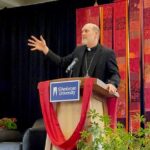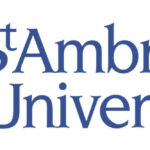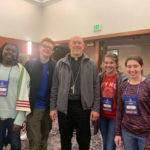By Barb Arland-Fye
The Catholic Messenger
Father Kevin Anstey grew up in a rural community and now serves rural parishes in Knoxville and Melcher. Father Dan Dorau grew up in the city and now serves rural parishes in Houghton and St. Paul where he is learning the lay of the land in his new assignment, his first as a pastor.
Both priests traveled to central Wisconsin last month to participate in a Thriving in Rural Ministry Retreat with 12 other priests serving in rural communities around the country. The retreat, an initiative of Catholic Rural Life, seeks to foster spiritual renewal, share best practices in rural ministry, enhance leadership skills, provide insights into integral ecology, and offer fellowship.

Father Dan Dorau blesses the new home of the parish bats at St. John Parish in Houghton. The new bat home is an alternative site for the bats to live instead of the church building.
“Bishop Thomas Zinkula suggested that I ask Father Kevin (farm boy) and Father Dan (city boy) to attend the retreat,” said Deacon Dan Freeman, co-chair of the Catholic Rural Life chapter of the Davenport Diocese. “Catholic Rural Life designated speakers with a rural voice, along with those pastors from a rural background, to share rural pastoral ideas with those from an urban background.”
Father Dorau welcomed the opportunity to talk with new pastors serving in rural parishes because his ministry since ordination to the priesthood in 2017 had been in urban areas of the Davenport Diocese. On July 1, he began a new assignment as pastor of two rural parishes, St. John Parish in Houghton and St. James Parish in St. Paul.
One of his takeaways from the retreat was “not so much a solution as a direction; find a way to get administrative duties off of my plate so that I can be more pastoral, get out on the farm,” Father Dorau said. He also gained insight about encouraging families to see the connection between farming and faith, bringing the church into agriculture.
The priest said he was surprised to learn that none of the 244 Catholic colleges and universities in the U.S. offer a degree in agriculture. Agriculture majors get their degrees at secular colleges and universities “devoid of a Christian perspective on farming, land, theology and ecology,” Father Dorau said. “It is incumbent upon us to bring that back to them.”
Farmers need to see that what they do is as much a vocation as their livelihood. For Father Dorau, “it’s a different kind of relationship building,” now challenged by the ongoing pandemic. “It’s been a real struggle to get to know my people,” said the priest, whose new assignment began in the midst of the pandemic.
“I’ve gone out and done some anointing. A lot of people say, ‘When this is all over, we’ll invite you to dinner.’” In the meantime, he has been “trying to get a handle on being a pastor and all of the duties entailed in that.”
He has visions of someday walking around town and praying the rosary and just being visible to people. A retreat participant suggested going to a grain elevator to get to know the guys, to go where the farmers will be.
Over the years, the emphasis in farming moved toward efficiency and profitability, Father Dorau said. Caring for God’s legacy is another way to carry on farming for generations to come. He said society as a whole needs a new perspective on the value of food that farmers produce. “We need to affirm the family farmer.”
The retreat provided Father Anstey with an enlightened perspective on priests new to rural ministry. “Things stood out to them that I might have taken for granted or had not given a lot of thought to,” he said.
The interconnectedness among people living in rural communities, for example, seemed foreign to some priests new to rural ministry. “Small communities might have three or four big family groups that make up the majority of the community. That can seem hard to navigate for someone new to that,” Father Anstey said. “But there’s also a lot of communication and support there because people have a big extended family close by.”
Someone at the retreat pointed out that people in big cities oftentimes view environmental issues as polarizing between urban and rural dwellers. That person “got to know some farmers and realized that they take stewardship seriously,” Father Anstey said. Using the land to make a living and taking care of the land are not opposing values.
He remembers arriving at his new assignments in Knoxville and Melcher four years ago and driving around the area to view the lay of the land. The beauty of the rural landscape caused him to think to himself, ‘I’m getting away with something, living here.’”
Several priests at the retreat talked about being in awe of God’s creation, which reminded Father Anstey, “I don’t always look out the window with the same sense of awe I used to’… You can see people cooperating with God’s creation and being a part of it.”
He said he also showed new rural pastors “a view of rural life that isn’t quite so romanticized. Sometimes we have to acknowledge that people are people. Not everything is going to be different. There are still struggles and some things are more difficult in a rural area.”
“A lot of people don’t have as much of a community identity as they used to … there are fewer high schools, fewer family practice doctors, some of our hospitals are struggling to find their niche to meet the needs in rural counties and to stay open.” The independent spirit “can be a wonderful thing and guide people to innovation, but can also hurt them because they don’t reach out for help when they need it,” Father Anstey continued.
When he served at St. John Vianney Parish in Bettendorf, Father Anstey could visit four or five people at a couple of different hospitals in the Quad Cities “and it didn’t take long and there wasn’t a whole lot of driving.” Now he spends a couple of days a week making round trips to visit parishioners in the hospital or nursing homes scattered throughout the region.
In rural communities, “people really do understand the limitations. If they ever had a relative in the hospital, they know it can take a half-day to visit somebody. People understand I can only be in one place at a time,” Father Anstey said.
“Every Thriving in Rural Ministry Retreat has generated a renewed sense of mission and hope for rural priests in their respective parishes. We are grateful to be able to offer this retreat experience to pastors who minister in rural areas,” said Jim Ennis, executive director of Catholic Rural Life.
As for the future, Father Dorau looks forward to meeting quarterly (via video conference) with his retreat cohort to discuss issues particular to rural ministry. Deacon Freeman hopes more pastors will attend upcoming Thriving in Rural Ministry retreats “to enhance their own and the diocesan rural ministry efforts.” Father Anstey anticipates a culminating retreat that will draw all of the cohorts together. “It’s about a big group of people being together for a common purpose. That can be energizing.”
Upcoming rural ministry programs
Catholic Rural Life (CRL), a national nonprofit organization dedicated to the vitality of the American countryside, received a $1 million grant from Lilly Endowment Inc.’s Thriving in Ministry initiative to help establish a Thriving Rural Ministry program.
With the five-year grant, CRL created a program to offer retreats for pastors serving in rural ministry to come together and learn from one another, to deepen relationships and to build fraternal communities. This initiative establishes a network of pastors serving rural communities who can encourage, sharpen and help one another.
Upcoming retreats are scheduled Feb. 8-12 in Houston and June 14-18 in Mount Angel, Oregon. Visit the website (https://catholicrurallife.org/impact/thriving-in-rural-ministry/) for more information.











